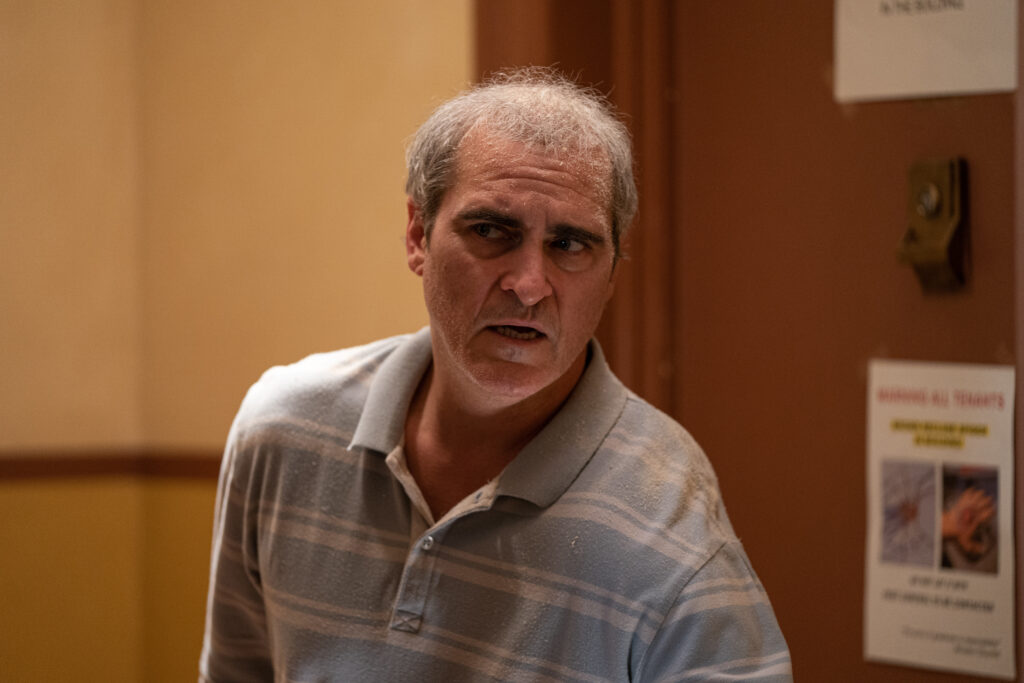April 14, 2023
by Carla Hay

Directed by Ari Aster
Culture Representation: Taking place in 2022 (with some flashbacks to the early 1990s), in fictional U.S. cities, including one named Wasserton, the dramatic film “Beau Is Afraid” features a predominantly white cast of characters (with a few African Americans, Latinos and Asians) representing the working-class, middle-class and wealthy.
Culture Clash: A never-married, 47-year-old bachelor has to reckon with his volatile and co-dependent relationship with his widowed mother, who became a successful business mogul.
Culture Audience: “Beau Is Afraid” will appeal primarily to people who are fans of star Joaquin Phoenix, writer/director Ari Aster, and movies that blur the lines between fantasy and reality for the characters.

“Beau Is Afraid” is an experimental fever dream about parent/child issues and mortality. Ari Aster fans expecting a horror movie will be disappointed. Joaquin Phoenix’s acting is stellar, but this three-hour film is too long and too weird for some viewers.
“Beau Is Afraid” writer/director Aster previously wrote and directed 2018’s “Hereditary” and 2019’s “Midsommar,” which were two unsettling horror films that had a straightforward narrative. Out of all three movies, “Beau Is Afraid” is the most wildly imaginative but also the least appealing to a general audience. There are some gruesome and violent scenes in “Beau Is Afraid,” but it is definitely not a horror film.
It’s a psychological portrait that is often hallucinogenic, but the themes of love and loss are never far from the surface. The movie is called “Beau Is Afraid” because paranoia, mental illness and physical danger always seem to be ready to pounce on the protagonist and other characters at any given moment. And what makes Beau afraid could be real external threats or anything from within himself.
The movie’s title character is Beau Wassermann (played by Phoenix), a lonely and disheveled 47-year-old bachelor who has never been married and who lives alone. Viewers know that Beau is 47 because it’s mentioned several times later in the film that Beau (who has no siblings) was born in 1975, and that the “current” part of the story takes place in 2022. There are several flashbacks in the movie, most notably when Beau is in his mid-teens. Armen Nahapetian plays the role of teenage Beau.
The movie’s opening scene is supposed to show Beau’s birth, from his perspective as a newborn. Viewers hear his mother’s panicked voice because she couldn’t hear her baby crying. The doctor in the room repeatedly slaps the baby until he starts crying. It sets the tone for much of what happens to Beau in the movie, because life just keeps giving him one proverbial slap after the next.
Middle-aged Beau currently lives in a run-down and dingy apartment building in an unnamed big city that resembles New York City. (“Beau Is Afraid” was filmed in New York state and Montreal.) Beau lives in a dangerous neighborhood filled with criminals, hustlers and other street people, causing mischief and mayhem outside at all hours of the day and night.
Early scenes in the movie show that human life is not valued where Beau lives. While walking home one day, he sees a small crowd gathered around a high-rise building where a man on the roof looks like he’s going to jump. The crowd is encouraging the man to jump, while some people are gleefully filming everything with their camera phones. Outside the building where Beau lives, a dead man’s decaying body has been left to rot on the street.
How dangerous is this neighborhood? Every time Beau goes to his apartment building, he has to be on the lookout for a man covered from head to toe in tattoos. This unnamed man (played by Karl Roy) chases Beau and tries to get inside the building. Beau has to outrun this menacing person and quickly lock the front door of the building behind him. No explanation is given in the movie for who this man is and why he has targeted Beau.
Beau is in psychiatric therapy and has been prescribed medication. In a session with his psychiatrist Jeremy Friel (played by Stephen McKinley Henderson), Beau says that he has big plans to visit his mother the next day, because it’s the anniversary of the death of Beau’s father, who passed away before Beau was born. Beau is taking a plane trip to visit his mother Mona Wassermann, who lives in Beau’s hometown of Wasserton. (The name of this hometown in the first big clue that Beau’s reality might not be what it first appears to be.)
Dr. Friel asks Beau: “Are you going there with realistic expectations?” Beau doesn’t answer the question. Dr. Friel then asks Beau, “Do you ever wish your mother were dead?” A horrified Beau says no and wonders why the doctor would ask that type of question. Dr. Friel says that it’s possible to love someone and also wish that this person were dead. The two feelings don’t have to be mutually exclusive.
In case that therapy session scene didn’t make it clear enough, the rest of “Beau Is Afraid” makes it abundantly clear that Beau has overwhelming “mommy issues.” In psychiatric Freudian terms, Beau would probably diagnosed with having an Oedipus complex. He’s a man-child who has an unhealthy attachment/fixation on his mother and what she wants him to do with his life. Issues related to Beau’s love life are also largely influenced by how he feels about his mother.
Viewers never find out if Beau has a job. As revealed later in the movie, his mother Mona is a successful and wealthy business mogul. Her line of work won’t be mentioned in this review, because it’s revealed in one of the movie’s more emotionally powerful scenes. It’s enough to say that Mona raised Beau to be very afraid of germs. He was taught not to eat many different types of food that most people eat but which Mona told Beau was “unsafe” for him to consume.
Before he goes to visit his mother, Beau buys a small white ceramic figurine of a mother holding her baby. On the bottom of the figurine, Beau writes this inscription: “Dear Mom, I’m sorry this is the anniversary of Dad’s death. Thank you. I’m sorry. Love, Beau.” This mother/child figurine is a symbol that shows up later in the movie. Viewers also find out fairly early in the movie that Beau has unusually large testicles. His genitals are used as a sight gag in several of the movie’s more outlandish comedic scenes.
Strange things start happening to Beau almost immediately. The night before he goes on his planned trip, while he’s trying to sleep, someone slips hand-written notes underneath his door to ask him to turn down his loud music, even though Beau isn’t making any noise. The next day, he oversleeps and wakes up in the afternoon, only two hours before his plane flight is supposed to leave.
And things get worse from there. In the rush to pack his suitcase, Beau forgot to include his dental floss. He leaves his suitcase in the hallway and his keys in the front door as he goes back in his apartment to get the dental floss. When he returns to the hallway, he sees that his keys and his suitcase have been stolen. The rest of “Beau Is Afraid” is an endurance test for Beau (and for viewers who won’t like this type of movie), as more odd things keep happening to Beau while he tries to find a way to see his mother.
While out on the street, Beau gets accidentally hit by a car driven by a grieving mother named Grace (played by Amy Ryan), who takes him to her suburban home instead of to a hospital. Grace’s surgeon husband Roger (played by Nathan Lane) gives Beau medical treatment. The couple’s sulking daughter Toni (played by Kylie Rogers), who’s about 16 years old, grows increasingly resentful that her parents have let Beau stay in her room, while Toni has to sleep on the couch in the family’s living room.
Grace and Roger are in emotional pain from the death of their young adult son Nathan, who died in Caracas, Venezuela, while he was serving in the U.S. Army’s 82nd Airborne Division. Nathan’s tall and large Army buddy Jeeves (played by Denis Ménochet), who witnessed Nathan’s death, is staying with Grace and Roger too. Jeeves is mute, mentally ill, and prone to attacking people randomly. (It’s implied that Jeeves has post-traumatic stress disorder.) Later in the movie, Toni and Toni’s teenage friend Penelope (played by Hayley Squires) take a drug-induced car ride with Beau.
Beau’s domineering mother Mona is portrayed by Zoe Lister-Jones in Beau’s teenage years, and by Patti LuPone in Beau’s middle-aged years. Viewers see the personality change between the younger Mona and the older Mona. This change is one of the reasons why Beau has so many unresolved issues with his mother. Aside from Phoenix’s tour-de-force acting in “Beau Is Afraid,” LuPone gives a standout performance in the short time (less than 20 minutes) that she’s in the movie.
Another character who is seen in different time periods is Beau’s love interest Elaine Bray, who is about the same age as Beau. Elaine and Beau first met as teenagers when he was on vacation with his mother at an unnamed resort, where Elaine was staying with her own domineering mother. As an adult, Elaine ended up working for Mona. Julia Antonelli has the role of teenage Elaine, while Parker Posey has the role of middle-aged Elaine.
Richard Kind has the role of Harold Cohen, the Wassermann family’s attorney, who is heard talking to Beau on the phone and is then later seen toward the end of the movie. Even though Harold is not a doctor, Beau keeps calling him “Dr. Cohen,” and this misidentification greatly annoys Harold. Bill Hader has a very brief cameo as a UPS delivery person. The movie trailer and other marketing materials for “Beau Is Afraid” show Phoenix made to look like an elderly man. It’s another character in the movie that’s exactly who you think it will be, once it becomes obvious that Beau has an Oedipus complex.
“Beau Is Afraid” has terrific production design for the locations where Beau goes to in the movie, but the story is going to be too confusing and too abstract for some viewers. It’s a fascinating, sometimes funny film (if you can tolerate offbeat and violent comedy), but it can also be long-winded and a little too pretentious. The best way to appreciate “Beau Is Afraid” is to know before seeing the movie (or at least figure it out within the first half of this film) that it’s about the dangers of not expressing true feelings for a loved one, and how those repressed feelings can do a lot of damage.
A24 released “Beau Is Afraid” in select U.S. cinemas on April 14, 2023, with a wider release in U.S. cinemas on April 21, 2023.
